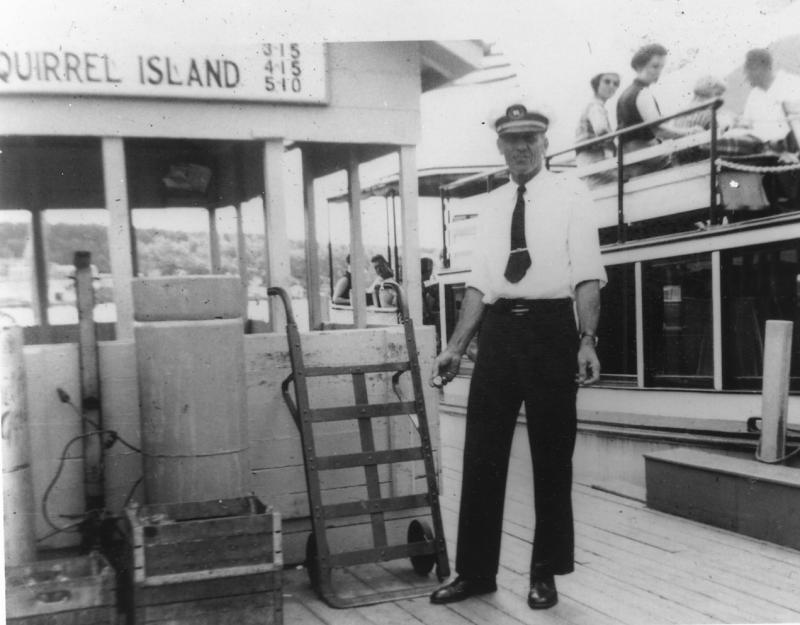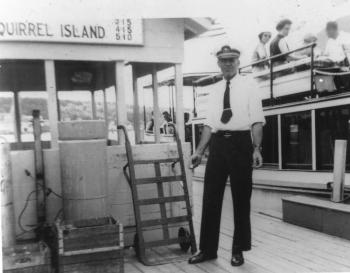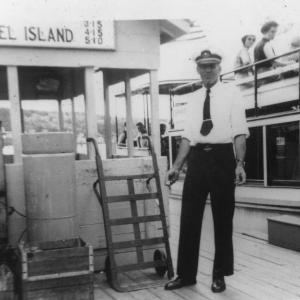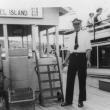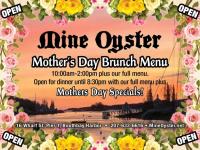The Passenger Boat Association and Captain Ross Dickson, Part III
This is the last of Jean Chenoweth’s three articles on her 1960 summer job selling tickets for boat trips and her friendship with Captain Ross Dickson who made his living on the ocean. He had a master mariner’s license, unlimited — any tonnage, any ocean. He was a valued pilot for large coastal vessels during World War II and captained tugs, steamers, and passenger boats locally. Barbara Rumsey
Ross Dickson
He and Hazel lived in the house he had built for them on the corner of Howard Street. He was very proud that the materials for that house only cost him $500. It had a lovely living room and dining room with heavily varnished woodwork, a winter kitchen and a summer kitchen, bedrooms and bath upstairs, and a garage/workshop. They had two daughters, Shirley and Carmelita. Hazel decided they were getting old and she didn't want anyone to read the love letters he sent her before they were married, so one day she read them all one last time, tore them into shreds, and stuffed a pillow with the remains. She told me she cried the whole time while doing that but Ross just smiled and said, “I imagine all my old girlfriends cried when they tore up my love letters.” He had been a handsome young man, always liked the girls, and I'm sure a lot of them liked him too.
Hazel Dickson
Hazel was undoubtedly a lively young woman. One day when she was old, she got settled in the living room with a glass of blackberry wine and a cigarette (she hardly ever smoked) and looked up to see the minister coming to visit. She was very embarrassed, hastily hiding all the “evidence.” We laughed about that. She went to church every Sunday. Ross didn't. He went deer hunting in the fall and moved a smelt shack onto the ice every winter. He had a very large garden, all of which is now part of the grounds of the Boothbay Region Greenhouses. He had a wire fence around the garden and grew beautiful scarlet runner beans there. He always gave me a handful of those beans in the fall. In addition to many vegetables, he grew blackberries and made great blackberry wine. He had fruit trees with the best plums I've ever eaten. He stayed active and always cheerful.
He had Hazel try out salt pork and poured the fat all over his food. He ate a pound of chocolates every day and he lived to be 94 years old. He got glaucoma and lost his eyesight along the way but just laughed and said, “I've seen everything anyway.” He told me people asked him why he had younger people for friends. He said if he hadn't, then all of his friends would have been dead by now. So now in my later years I try to remember to always have younger friends too. He wanted to give me something to remember him by and I wanted the Captain Pugsley book but there had been a fire in his living room and that book and some others got damaged. So he gave me his Bowditch, The American Practical Navigator, which I later donated to the historical society.
Toward the End
When he got sick we visited him at St. Andrews Hospital. He had a window that looked out over the harbor but was blind by then. He told me, “I can't see anything today because they have the shade drawn but yesterday was wonderful; the harbor was full of coasters coming and going all day.” He was “seeing” the harbor that my mother used to describe from the 1920s and 1930s. They moved him to a nursing home in Brunswick. His daughter Shirley lived near there so she and Hazel were spending their days with him. They said they had to go home to dinner but would be back after they had eaten. He frowned and said “What time will that be?” They replied, “Right around 6:30.” Ross said, “Oh hell, I'll be dead by then.” They went home, ate, came back and Ross was dead. Hazel asked the nurse “When did he die?” And the nurse said, “6:30.” I didn't know he had died but that night I dreamed about him heavily and when I woke up I felt like I knew Ross was gone. Later that day Hazel called me and told me that he had died. We went to his funeral and they read “Crossing the Bar” by Alfred Lord Tennyson which was very appropriate:
“Sunset and evening star
And one clear call for me!
And may there be no moaning of the bar
When I put out to sea.
But such a tide as moving seems asleep,
Too full for sound and foam,
When that which drew from out the boundless deep
Turns again home.
Twilight and evening bell
And after that the dark!
And may there be no sadness of farewell,
When I embark;
For tho' from out our bourne of Time and Place
The flood may bear me far,
I hope to see my Pilot face to face
When I have crost the bar.”
Whenever I go past Ross' s house I always look up at the attic window, hoping to see his ghost waving cheerily at me, but of course, I never do. But I always think of him when I see the ocean, especially at sunset.
Event Date
Address
United States

